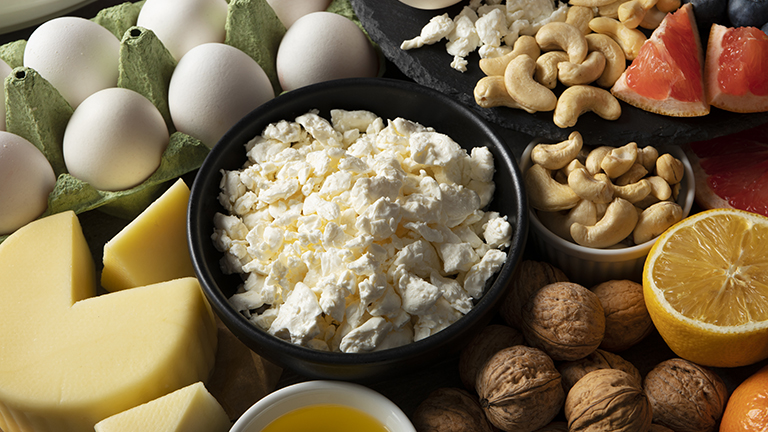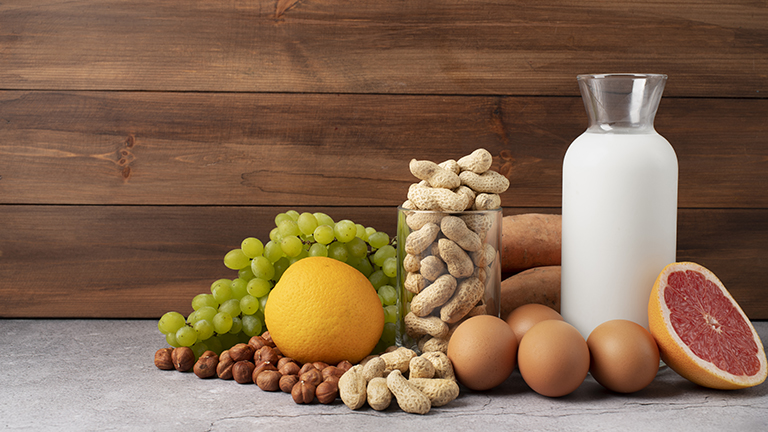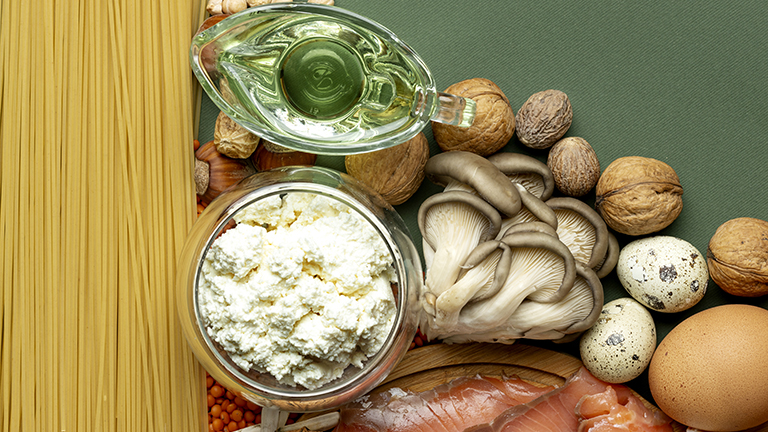Calcium Rich Foods for Bone: Calcium is one of the most essential minerals in the human body, playing a vital role in maintaining strong bones and teeth. About 99% of the body’s calcium is stored in bones and teeth, where it supports structure and function. Beyond bone health, calcium is critical for nerve signaling, muscle contraction, blood clotting, and hormonal secretion. Without sufficient calcium intake, bones can weaken over time, increasing the risk of fractures, osteoporosis, and other skeletal issues.
Maintaining optimal calcium levels is crucial throughout life, from childhood when bones are developing, to adulthood and old age when bone density naturally declines. Proper calcium intake, combined with a healthy lifestyle, can significantly reduce the risk of bone-related diseases and improve overall well-being.
Why Calcium is Essential for Strong Bones
Best Calcium Rich Foods for Strong Bones, Calcium functions as the structural backbone of bones and teeth. When dietary calcium is inadequate, the body compensates by leaching calcium from bones, leading to decreased bone density. This can result in conditions like osteoporosis and osteopenia, making bones fragile and prone to fractures. Strong bones are particularly important for elderly populations and postmenopausal women, as calcium deficiency becomes more common with age.
Besides skeletal health, calcium regulates heart rhythm, ensures proper muscle function, and supports neural communication. Therefore, a diet rich in calcium not only benefits bones but also contributes to overall physiological stability and vitality.
[INSERT_ELEMENTOR id=”5108″]
How Calcium Works in the Body
Calcium is absorbed in the small intestine, a process facilitated by vitamin D. Once absorbed, calcium is deposited into bones and teeth, or used for vital bodily functions such as muscle contraction and nerve signalling. The efficiency of calcium absorption depends on age, dietary habits, and the presence of other nutrients. Excessive consumption of salt, caffeine, and phosphorus-rich processed foods can hinder calcium absorption, making it important to focus on natural, calcium-rich foods.
Best Calcium-Rich Foods
Dairy Products High in Calcium (Milk, Yogurt, Cheese)
Dairy products are widely recognised as the richest and most bio available sources of calcium. Milk, yogurt, and cheese contain high levels of calcium in forms that the body can efficiently absorb. Whole milk, low-fat milk, and fortified milk alternatives provide calcium essential for bone development and maintenance. Yogurt, especially Greek yogurt, offers not only calcium but also probiotics, which support digestive health. Cheese, particularly hard cheeses like parmesan and cheddar, delivers a concentrated source of calcium that can easily be included in daily meals.
Leafy Green Vegetables (Kale, Spinach, Broccoli)
Leafy greens are excellent plant-based sources of calcium, particularly for vegetarians and vegans. Kale and broccoli are among the most calcium-dense vegetables, providing essential minerals while being low in calories. Spinach also contains calcium, though its oxalate content can reduce absorption slightly. Including a variety of green vegetables ensures a balance of calcium and other nutrients vital for bone health.
Fish and Seafood (Salmon, Sardines, Shrimp)
Certain fish and seafood are naturally rich in calcium, particularly those consumed with bones. Sardines and canned salmon provide calcium in a highly absorb able form due to their edible bones. Additionally, fish like salmon are rich in vitamin D, which enhances calcium absorption and further supports bone health. Shrimp and other seafood offer moderate calcium levels along with essential omega-3 fatty acids, beneficial for overall skeletal and cardiovascular health.
Nuts and Seeds (Almonds, Chia Seeds, Sesame Seeds)
Nuts and seeds are nutrient-dense sources of calcium. Almonds are particularly high in calcium and also provide healthy fats, protein, and magnesium. Chia seeds contain a significant amount of calcium per serving and can be easily added to smoothies, cereals, or baked goods. Sesame seeds, especially when consumed as tahini, provide not only calcium but also other minerals that enhance bone strength. These foods are excellent for individuals seeking plant-based calcium sources.
Legumes and Beans (Soybeans, Lentils, Chickpeas)
Legumes are versatile sources of calcium suitable for a variety of diets. Soybeans, in particular, are high in calcium and can be consumed as tofu, edamame, or soy milk. Lentils and chickpeas also provide calcium, along with protein, fiber, and other minerals beneficial for bone and cardiovascular health. Regular consumption of legumes contributes to maintaining adequate calcium intake, particularly for vegetarians and vegans.
Fortified Foods (Plant Milks, Cereals, Juices)
Many plant-based milks, breakfast cereals, and juices are fortified with calcium to help individuals meet daily requirements. Fortified almond, soy, and oat milks can serve as excellent dairy alternatives, providing comparable calcium levels. Fortified cereals and juices also provide calcium while delivering additional vitamins and minerals, making them convenient options for those seeking to enhance bone health through diet.
Calcium for Different Age Groups
Calcium Needs for Children and Teenagers
Children and teenagers require higher calcium intake to support rapid bone growth and development. Adequate calcium during these formative years helps establish peak bone mass, reducing the risk of osteoporosis later in life. Dairy, leafy greens, nuts, and fortified foods should be regularly incorporated into children’s diets to ensure proper skeletal development.
Calcium for Adults and Seniors
Adults need to maintain consistent calcium intake to preserve bone density and prevent bone loss. For seniors, adequate calcium consumption becomes even more critical as natural bone density declines with age. Adults should focus on calcium-rich foods alongside vitamin D to ensure proper absorption and reduce the risk of fractures.
Calcium Considerations for Pregnant and Lactating Women
Pregnant and lactating women have increased calcium needs to support fetal development and milk production. Consuming sufficient calcium-rich foods during these periods ensures both maternal and infant bone health. Dairy products, leafy greens, nuts, and fortified foods are especially important during pregnancy and breastfeeding.
Enhancing Calcium Absorption
Role of Vitamin D in Bone Health
Vitamin D plays a crucial role in calcium absorption and bone health. Without sufficient vitamin D, calcium cannot be effectively absorbed from the diet, even if intake is adequate. Sun exposure, fatty fish, fortified foods, and supplements are key sources of vitamin D, which works synergistically with calcium to strengthen bones.
Foods that Help Absorb Calcium
Certain foods improve calcium absorption, including those rich in vitamin D, magnesium, and vitamin K. Fatty fish, eggs, green leafy vegetables, nuts, and seeds enhance the bio availability of calcium, supporting optimal bone density. Balancing calcium intake with these nutrients ensures that bones receive the full benefit of dietary calcium.
Habits That Reduce Calcium Absorption
Some habits and dietary patterns can hinder calcium absorption. Excessive intake of caffeine, sodium, and phosphorus-rich processed foods can reduce calcium bio availability. Additionally, smoking and excessive alcohol consumption negatively affect bone health. Limiting these factors while prioritising calcium-rich foods promotes optimal skeletal health.
Common Myths About Calcium and Bone Health
There are several misconceptions surrounding calcium intake. Many believe that only dairy products provide calcium, yet a variety of plant-based foods and fortified products are equally effective. Another myth is that high calcium intake alone guarantees strong bones; in reality, balanced nutrition, physical activity, and vitamin D are equally important. Understanding these facts helps individuals make informed dietary choices for long-term bone health.
Table: Calcium Rich Foods for Bone
| Food Category | Examples | Calcium Content (mg per 100g) | Additional Benefits |
| Dairy Products | Milk, Yogurt, Cheese | 100–350 mg | Protein, Vitamin D, Probiotics |
| Leafy Green Vegetables | Kale, Spinach, Broccoli | 150–200 mg | Fiber, Vitamin K, Magnesium |
| Fish & Seafood | Sardines, Salmon, Shrimp | 200–400 mg | Omega-3 Fatty Acids, Vitamin D |
| Nuts & Seeds | Almonds, Chia Seeds, Sesame Seeds | 150–270 mg | Healthy Fats, Magnesium, Fiber |
| Legumes & Beans | Soybeans, Lentils, Chickpeas | 80–200 mg | Protein, Fiber, Iron |
| Fortified Foods | Fortified Plant Milks, Cereals, Juices | 120–300 mg | Added Vitamin D, B Vitamins |
| Tofu & Tempeh | Firm Tofu, Tempeh | 150–350 mg | Protein, Isoflavones |
| Other Vegetables | Okra, Turnip Greens | 90–150 mg | Fiber, Antioxidants |
| Seeds | Flax Seeds, Pumpkin Seeds | 90–200 mg | Omega-3, Fiber, Magnesium |
| Snacks | Calcium-fortified Bars | 100–250 mg | Vitamins & Minerals |
Daily Calcium Intake Recommendations
How Much Calcium You Need Per Day
Calcium requirements vary by age, gender, and life stage. Children, teenagers, adults, seniors, and pregnant or lactating women have specific daily needs ranging from 1,000 mg to 1,300 mg per day. Tracking intake from foods and supplements ensures that individuals meet their daily requirements without exceeding safe limits.
Tracking Your Calcium Intake
Monitoring calcium intake can be achieved through dietary tracking apps, meal planning, and nutrition labels. By ensuring a consistent intake of calcium-rich foods, individuals can maintain healthy bones and reduce the risk of deficiency-related conditions.
Tips for Maintaining Strong Bones Naturally
Maintaining bone strength requires more than just calcium intake. Regular weight-bearing exercise, adequate vitamin D, limiting smoking and alcohol, and ensuring sufficient protein intake all contribute to healthy bones. Combining these strategies with a diet rich in calcium helps prevent osteoporosis and fractures, promoting overall skeletal health throughout life.
Conclusion: Calcium Rich Foods for Bone
The most effective way to strengthen bones and prevent deficiencies is through a balanced diet including dairy products, leafy greens, fish, nuts, seeds, legumes, and fortified foods. These foods provide the calcium necessary for optimal bone development and maintenance, while offering additional nutrients that enhance absorption and support overall health.
Strong bones are built through consistent calcium intake, adequate vitamin D, regular physical activity, and a healthy lifestyle. By incorporating a variety of calcium-rich foods into daily meals and following bone-friendly habits, individuals across all age groups can maintain skeletal strength, prevent fractures, and enjoy long-term health.



